


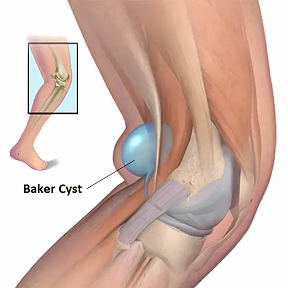
The Baker cyst on the back of your knee is a symptom of another injury inside your knee.
Yes, you want to get rid of the lump and the pain but you must also heal the underlying injury or the Baker's Cyst will return.
When it comes to treating a Baker Cyst, there's a lot of bad advice on the internet. Stretching, Drainage and Cortisone injections are not the solutions!
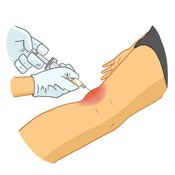
Your Bakers Cyst is a sac full of Synovial Fluid, and your body is making it to help heal an injury. That is your own body's medicine that it is making to heal another injury inside your knee. The issue is that as you move around, it is getting squeezed out of where it needs to be, into a sac called a bursa at the back of your leg. What you want to do is to gently squeeze the fluid back into your knee joint where it will help heal your knee. You don't want to drain it, and if you do, your body will keep making more as long as the other injury remains. Seek proper treatments for the underlying injury and use an ice compression wrap in 20 minute intervals throughout the day to try to move this valuable fluid back where it is needed.

There are a million companies selling bands and compression wraps for you to wear all the time. Companies like Amazon sell them because they can, not because they help. What does Amazon know about treating injuries? Nothing. If they can sell it, they sell it, and that's it. Honestly, wearing tight elastic bands around your joints all day long is a recipe for more damage to your knee. Squeezing your tendons and your ligaments and the parts of your joint so they rub against each other when you move is going to lead to damaged tendons and ligaments. Guaranteed. Yes, compression can help squeeze the synovial fluid back into the knee joint - but only do that when you are at rest! And only do it for 15 to 30 minutes at a time. Definitely not all day long, and definitely not when you are active. If you want support for your injury, tape it. Tape over it, not around it so your joint is getting squeezed.
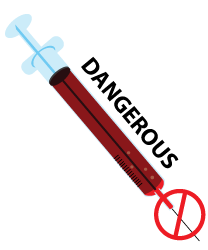
Cortisone injections are designed to temporarily relieve pain and swelling, however, they come with a variety of risks and side effects.
These include skin discoloration, allergic reaction, infection, and nerve damage.
They're also associated with tendon rupture.
Cortisone shots are not designed to heal the injury.
They simply mask the pain and can cause you to feel a false sense of ability, leading to a higher likelihood of re-injury.
If the cortisone shot is not administered properly, there's a chance that it won't have any effect.
Some people are also unable to metabolize cortisone, meaning it would not provide them with any relief.
Cortisone contributes to the thinning of tissue and an increase in the likelihood of a tendon rupture in your knee as a result!
Please visit our Cortisone Shots page for more information on the potential dangers of cortisone.
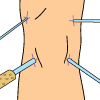
Surgery is not actually required in order to heal most soft tissue injuries. A partial tear can be healed without surgery in the majority of cases. Most of the time a Baker Cyst is due to a mild tear in the meniscus. Meniscus surgery should only be considered if your tissue is completely torn (in two separate pieces). And many surgeons offering "meniscus repair" actually just go in and remove parts of the meniscus to take away your pain, they don't actually repair the tear. That results in less pain but also less protection between your knee bones which will ultimately lead to worse problems down the road. Knee surgery should be avoided as much as possible and if you do go this route, pick your surgeon very carefully. There are many risks and complications associated with surgery, including nerve damage, infection, tendon rupture, and more. There is also no guarantee that it will get rid of the problem for good.
If you do undergo surgery, you can still use our BFST® and ColdCure® products beforehand to help prepare your body, and after the procedure to accelerate your recovery. Always get a second opinion before signing up for knee surgery.
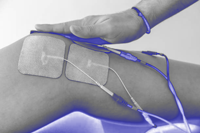
A TENS machine does not stimulate blood flow. TENS is an acronym that means Transcutaneous Electrical Nerve Stimulation. What a TENS machine is designed to do, is overstimulate the nerves to relieve pain - it deadens the nerves. While you want to reduce pain from your injury, using a TENS machine over an injury is highly not recommended. Having your muscles pulse and flex uncontrolled will cause further tissue damage and slow down healing. It is an important part of injury recovery, to feel the pain, and respect the pain. Pain is going to tell you when you're potentially causing further damage. Never mask the pain heading into any activity.
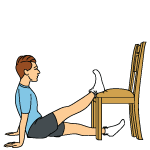
The purpose of physiotherapy is to help with strengthening the muscles surrounding your injury once the healing process is underway. Starting physiotherapy before your injury has had a chance to start healing and stabilize, will only cause further damage and more pain. After being inactive for an extended period of time, you get muscle atrophy (weakened muscles). As your injury heals, physiotherapy can be an excellent resource to help you rebuild that lost muscle. Just remember, your physiotherapist cannot feel what you feel. If you feel pain during physio or afterwards advocate for yourself. Physio should not hurt. You need to work within your pain limits. If an exercise hurts, you need to stop that exercise because you're not ready yet. As you heal you will be able to do more, but do not push yourself because this will only cause re-injury. This is true throughout your entire knee recovery. Always respect the pain.
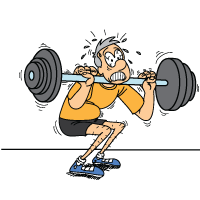
Rest is very important when recovering from an injury.
Of course, too much rest can cause weak and stiff muscles, but resting when you can will help you avoid further injury.
While it is true that moving promotes blood flow, and in turn blood flow promotes healing, too much movement too soon in the healing process is a bad thing, as it only results in re-injury and a much longer recovery time.
Exercise and Stretches do nothing to help a Baker Cyst itself.
It is exercise and activity that is squeezing the synovial fluid out of the knee and into the bursa creating this issue.
More of what is causing the problem will not fix the problem.
Certain exercises and stretches may be beneficial to rebuild your muscles after you address the underlying injury.
But these should not be done until you are further along in the healing process.
If you are doing them too early you will know because your cyst will start to grow again.
You need to accept that for a short while, reducing your activity is important to letting your knee get over the hump in terms of healing.
You cannot keep doing the same level of activity you were doing before becoming injured.
You need to let your knee rest.
If you are driving through the pain, you are just making your situation worse.
This can't be stressed enough about knee injuries because your initial injury has turned into an overuse injury.
Rest is critical. Give your knee a break.
You can gradually work your way back up to your regular activities, but this will take some time.
You may want to consider activity modification.
This means trading in high impact activities like running for low impact activities like swimming.

Painkillers should never be used during times of physical activity. This is because painkillers completely block the pain signal, making you totally unaware that you're doing more damage to the injured area. Painkillers mask the pain, tricking you into thinking you're better and able to push yourself physically, when this will only result in further injury. Make sure you restrict painkillers to times when your body is at rest. An ideal time to take painkillers is before bed. Using painkillers when you're active means risking complete rupture of your tissue, and this means surgery and an even longer recovery.
While painkillers are effective at relieving pain and inflammation, they are not designed to address the root cause. In situations where the underlying injury is osteoarthritis or tendonitis, some meds can help if used at the right times. For more information about which meds help and when, give us a call, our treatment advisors will give you some excellent free advice. You need more than painkillers, though, if you really want to heal.
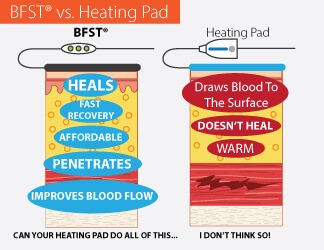
While using a heating pad on an injury can feel good due to the warmth, they do not provide any healing benefits.
Many sites online are marketing heating pads in place of proper treatments like BFST®.
The reality is that BFST® can heal soft tissue injuries, and heating pads can't.
BFST® stimulates healthy blood flow in the area of your injury, deep below the skin.
This increase in blood flow works to speed up the healing process.
Heating pads can't do this.
Heating pads simply bring blood to the surface of your skin, making it hot to the touch.
Unfortunately many people buying inexpensive Chinese heating pads from American companies, like you see all over the internet, end up getting burned, not healed.
There are thousands of complaints filed with FDA every year from people who get skin burns or burnt furniture and house fires from defective heating pads that were sold as solutions to their injuries.
And unfortunately those only represent a small portion of the people actually getting hurt.
Get BFST® for healing.
BFST® technology far surpasses the heating pad in terms of therapeutic benefits.
BFST wraps are 100% safe and heavily vetted by over 300,000 users and several regulatory bodies including FDA.

Bleeding should slow down if you raise an injury higher than your heart; however, this isn't necessary for a knee injury. Particularly with a Baker's Cyst, that synovial fluid only needs to drain from the bursa back into your knee. Raising your knee isn't going to move the fluid to any other area of your body, because it's not even attached to your blood flow or affected by blood pressure. Simply resting the injury is sufficient.
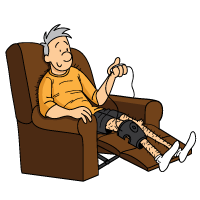
One of the biggest mistakes you can make during recovery is stopping treatment before your injury has finished healing. The healing process does not end once the pain stops. The healing process takes much longer than most people realize. (You can click here for the full story.) The key thing to remember is that long after the pain stops, your tissue is still healing. This means you need to continue doing BFST® treatments in order to complete the healing process. Doing regular BFST® treatments for several months after the pain is gone is extremely beneficial. Do a BFST® treatment prior to any physical activity to warm up your circulatory system and to help avoid re-injury.
Most people think that RICE - Rest, Ice, Compression & Elevation - is the formula to follow when treating inflammation, swelling and pain.
The truth is that ice can actually freeze your skin and numb your nerves, causing 'cold burns' and even permanent damage to your underlying tissue.
Rest is absolutely a good thing.
The proper solution is RCCE® - Rest, Cold, Compression & Elevation.
For Baker Cysts, the compression should be gentle and constant for 20 to 30 minutes at a time.
And for a Baker cyst, unlike most ailments, elevation isn't going to drain the cyst.
It might though give a little relief for what the underlying injury may be, but generally it is a minor help for Baker Cyst related injuries.
Where ice is concerned, we don't want to apply ice - we want to apply cold that is just around freezing.
Yes, you want cold - and lots of it - but not so cold that it is below the freezing point of water.
ColdCure® technology was developed specifically to address the need for a cold compression device that does not freeze the skin and underlying tissue.
ColdCure® gel packs pose no threat of cold burns.
This makes them much safer to use than other products that use ice, which can cause the skin to freeze, leading to permanent damage.
ColdCure gel packs are completely safe to use for extended treatment durations, meaning faster relief of pain and swelling.
ColdCure® technology is a huge improvement on regular ice packs.
The internet is full of bad advice about treating your knee. Here's a short list though: It's not your shoes. Draining it doesn't solve the underlying problem. Anti-inflammatories don't help - it's not that kind of swelling. Pain killers probably make it worse. Driving through the pain will just make it worse.
For a little while - not forever - it is really helpful to give your knee a rest. In many cases, resting your knee for a few weeks will give it time to heal to a point that your body gets ahead of the healing / reinjury cycle. It's important to realize that once the cyst goes away, your underlying injury may not be healed completely so take it easy and go back to regular life gradually once the pain and swelling are gone. If you want to be more proactive about healing the problem, you can click here to visit the Recommended Treatments page.
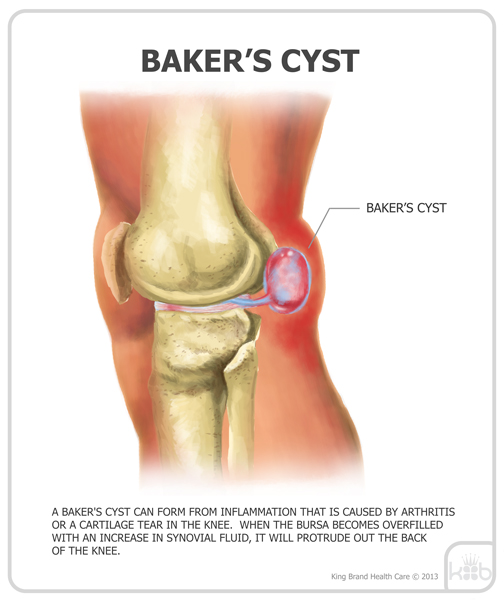
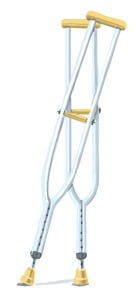
If you want your Baker's Cyst to go away as quickly as possible, you need to rest the affected knee. Avoid any physical activities that could cause further injury to your knee. If your Baker's Cyst developed from a knee injury or condition, do your best to avoid the activity that caused this knee injury or condition. Consider using crutches to keep the weight off your injured knee and avoid re-injury.
Do regular ColdCure® treatments to control the pain and swelling in the back of your knee. The compression during each treatment helps gently move the synovial fluid back into your knee from the bursa sac.
You can also focus on healing your underlying knee injury with regular BFST® treatments. This combination will work to finally get rid of your Baker's Cyst.
Around the 4-6 week mark you can start doing some light stretching and strengthening exercises. Slowly work your way back to your regular level of activity. Continue doing BFST® treatments long after the pain and lump disappear to maintain the healing you've done. Do a ColdCure® treatment if you experience any flare-ups of pain and swelling and after any significant activity.
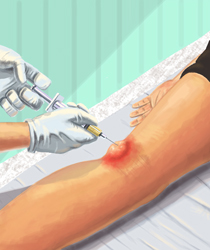
You don't have to undergo surgery in order to get rid of your Baker's Cyst. You can get rid of your Baker's Cyst with conservative treatments. However, it's possible that your underlying knee condition or injury requires surgery. These are very rare cases.
Meniscus surgery usually involves the removal of part of the meniscus and that is not what you want. That's a path to an eventual full knee replacement, it's just a temporary fix. You want to do everything you can to let your meniscus heal on its own.
Only in rare cases is it required for the Baker's Cyst to be drained or removed. If it's an option, you want to keep the synovial fluid and just move it back into your knee joint where it belongs, where it can help. In order to remove a Baker's Cyst, arthroscopic surgery must be performed.
If surgery is your only option, make sure your post-surgery recovery goes as smoothly as possible by using BFST and ColdCure. Use a ColdCure® Leg Wrap to reduce the inflammation and relieve the pain for the first few days following surgery. Once the inflammation has gone down, promote blood flow to the injured area using a BFST® Knee Wrap. This will improve your circulation and help you heal faster.
There is also a possibility that the Baker's Cyst could rupture, causing fluid to move into the calf and result in further swelling and pain in the calf. A ruptured cyst isn't great, but it's not the worst situation either. Until the underlying injury is dealt with, in some circumstances, it becomes difficult for the ruptured bursa to heal. You want a functional bursa to keep capturing the synovial fluid and return it back into your knee. Symptoms of a ruptured Baker's Cyst are similar to those of a blood clot, so if you're not certain that your Baker's Cyst has ruptured, please see your doctor.
Painkillers mask the pain, causing you to continue to stress and injure your knee. This will only make your condition worse. It is understandable that people need relief from the pain, so if you have to take painkillers, restrict them to times when you are off your feet. You can use painkillers to help you sleep. Using them when you are active is a recipe for permanent damage. Your choice of pain killers is important. You can give us a call to discuss which ones are best.
The ColdCure® Leg Wrap is designed to relieve the pain associated with Baker's Cysts. This safe and effective pain reliever is also great at bringing down swelling and inflammation. The ColdCure® Leg Wrap is incredibly soothing and provides support and protection for your Baker's Cyst. The painkilling element is incredibly powerful and it works instantly - there's no 20 minute wait like with pills.

Baker's Cysts can be extremely painful and debilitating. NSAIDs such as ASA, acetaminophen or ibuprofen are often used to treat the pain but these drugs do nothing to treat the actual condition. In fact, NSAIDs are known blood thinners and make the bleeding worse for fresh tissue injuries. Cortisone injections are used in extreme cases but these too are intended to address the pain. They do not promote healing of the injury itself and they put you at a very high risk of further injury.
You don't have to wait for endless months in pain. You can heal much more quickly with the right treatment. For a knee injury, blood flow is the most critical element in rapid recovery. Blood Flow Stimulation Therapy™ (BFST®) gives your knee the blood flow it needs to heal quickly and completely.
BFST® brings extra oxygen and nutrient-rich blood to the injured area - a requirement for the body to heal itself. Unfortunately, an injured knee at rest often has restricted blood flow, which extends your healing time and greatly increases the amount of scar tissue that develops. With a King Brand® BFST® Knee Wrap, blood flow can be stimulated in the area of injury while you are at rest. With improved blood flow and without physical activity and the risk of re-injury, you can recover from your knee injury at a surprisingly rapid rate.

King Brand® soft tissue rehabilitation medical products are the #1 choice by top Athletic Therapists and Medical Practitioners worldwide. We provide guaranteed results and customer satisfaction. Like all King Brand® products, there simply isn't a better performing option. All King Brand® products come with a 100% satisfaction guarantee. Try our products and if you are not completely impressed, you can send them back for a full refund. We know you will love them though, because thousands of people already use them and rave about the results.
Click here to see our Customer Testimonials
King Brand® BFST® and ColdCure® Wraps are FDA Registered medical devices. They are intended to prevent, treat and cure soft tissue injuries and chronic conditions. Part of being an FDA Registered company means that our products are made from high quality, biocompatible materials. These devices are manufactured and tested to the highest safety standards in the industry.